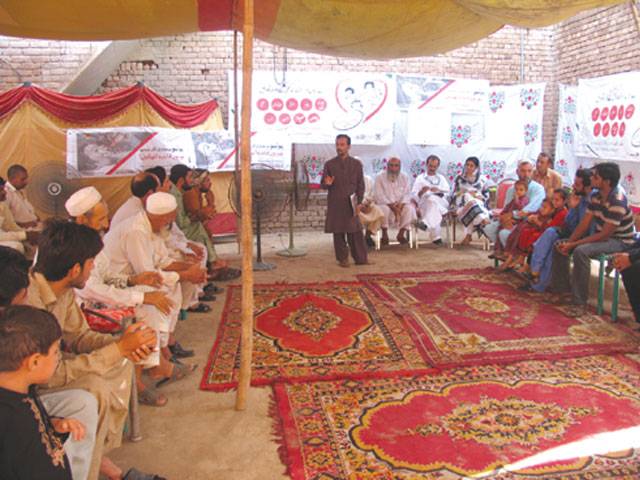MULTAN - “I was paralysed for life by polio when I was a minor. But the trauma has further strengthened my resolve to save other children from the crippling disease”, says Najeebullah Khan who is a Social Mobiliser with Communication Network, at an awareness session organised on Saturday for Pashtuns in Union Council Panj Faiz, Multan.
Multan has one of the largest nomadic populations in Pakistan belonging to all backgrounds including Pathans with their numbers reaching over 12,000.
The district has one of the largest numbers of children with their number going as high as 7.4 million.
Last polio case in the district was detected in October 2009 but recent samples taken from Kot Abdul Fateh Union Council suggest prevalence of polio virus in its sewage water, prompting more focused efforts on awareness and social mobilisation.
Pakistan’s battle against polio has been marked with challenges since the formal launch of the Polio Eradication Programme in the country in 1994.
The year was disastrous for Pakistan as it reported 25,000 polio cases in 1994. However it dropped down to 198 in 2011, still the highest number of cases in the world.
“I was one year old when my left leg stopped moving. My parents took me to several doctors and surgeons as far as Lahore. I was put to the knife by surgeons several times but all operations went in vain. Finally doctors concluded that I have polio”, says Najeebullah addressing the session attended by over a 100 community Pashtun members and their elders.
Najeebullah has obtained his Bachelors in Electrical Technology. His ancestors hail from Bajaur Agency, Inayat Kallay, and migrated to Multan in early 60s due to difficult terrain, cold weather and in search of livelihood.
Najeeb’s father who once turned down polio drops to his son now fully supports him in social mobilisation efforts.
“Polio is only preventable through vaccine. Do not hesitate to take your children to nearby health centres even if the government team does not show up at your home”, says Najeeb’s father addressing the Pakhtuns.
“I still remember the pain when I had to carry my son in my arms and travel to hospitals in search of help”, says sobbing Nasrullah Khan. Pakistan has suffered most of the polio cases in FATA and Khyber Pakhtunkhwa and nearly 80 percent of children that are paralysed due to polio have Pashtu speaking parents.
Epidemiological data indicates that Pashtun children are likely to receive fewer dozes of polio vaccine.
Competing risks that these families face in their daily life often outweigh the perceived risk of polio, thus, creating additional communication challenges.
Threats by militants and ban on polio vaccination in North and South Wazitristan agencies of FATA has forced government to abandon vaccination drives in these agencies leaving at least 2.6 million children at risk.
According to National Campaign Cell data thousands of Afghan refugees, internally displaced persons and seasonal workers migrate from Swat, Dir, Balochistan and Afghanistan to South Punjab districts including Multan.
Many of them set up their businesses and start living permanently here. Government with the help of polio eradication partners including Unicef map their communities and hold sessions with them regularly so that they cooperate with polio teams.
“Life in the agency is difficult in winter. Snow closes down everything in November, December, January and February which causes severe shortage of food and water forcing the families to flee to warmer plains of Punjab”, says Nasrullah Khan. “Militant violence and subsequent military operations have marred lives of people in Bajaur destroying employment opportunities forcing Pakhtuns to stay in Punjab until May so that weather turns pleasant in their respective agencies”, he says.
District health and communication support officer Zulekha Anwar says since the government polio teams lack Pashto communication skills the Pakhtun migrants refuse vaccination from them.
“It is here that Najeeb and his family comes in handy, bridging as a facilitator in engagement with priority populations”, she says.
According to Knowledge, Attitudes and Practices study most Pashtun communities are guided by strong traditional values, making outreach to them rather challenging, especially outsiders.
“After doctors discovered that I had polio they fitted a steel boot on my leg to help me recover. Although I continue to live with disability but my life has drawn attention of hundreds of Pakhtuns towards polio who cannot afford to ignore the lurking threat around them now”, Najeebullah Khan says.
Friday, April 19, 2024
Polio on prowl

US vetoes Palestine’s bid for full UN membership
8:27 AM | April 19, 2024
20pc Discos employees involved in power theft: Minister
April 19, 2024
Five govt officials shot dead in D I Khan
April 19, 2024
Parvez Elahi’s indictment delayed again in two cases
April 19, 2024
Hepatitis Challenge
April 18, 2024
IMF Predictions
April 18, 2024
Wheat War
April 18, 2024
Rail Revival
April 17, 2024
Addressing Climate Change
April 17, 2024
Justice denied
April 18, 2024
AI dilemmas unveiled
April 18, 2024
Tax tangle
April 18, 2024
Workforce inequality
April 17, 2024
New partnerships
April 17, 2024
ePaper - Nawaiwaqt
Advertisement
Nawaiwaqt Group | Copyright © 2024





